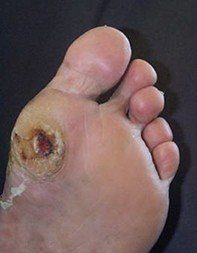Peer Reviewed
Perspectives
Management of diabetes-related foot ulcers: optimising outcomes
Abstract
Timely referral of patients to specialist multidisciplinary foot care services for intensive, comprehensive treatment of new onset foot ulcers is key to optimising outcomes. Continuity of care between the primary care setting and hospital services should be seamless to prevent unnecessary delays and to improve outcomes in affected patients.
Key Points
- Diabetes-related foot ulceration is common and affects up to one-quarter of people with diabetes mellitus.
- Key elements in managing diabetes-related foot ulcers are achieved by thorough assessment of the wound, the affected foot and the patient, followed by co-ordinated multidisciplinary care.
- Early assessment and appropriate referral of patients with diabetes-related foot ulcers, ideally to a specialist multidisciplinary foot care team, are key to optimising outcomes.
- Main elements of treatment of diabetes-related foot ulcers include individualised care in ulcer debridement and dressings, use of antibiotic therapy where indicated, pressure offloading, and, in some cases, referral of patients for consideration of revascularisation or orthopaedic foot surgery.
- With timely correct care, most diabetes-related foot ulcers will heal conservatively and patients requiring amputation will have tissue loss minimised and foot function maximised.
Purchase the PDF version of this article
Already a subscriber? Login here.

